Posted by Anita on 05.31.10 11:05 PM
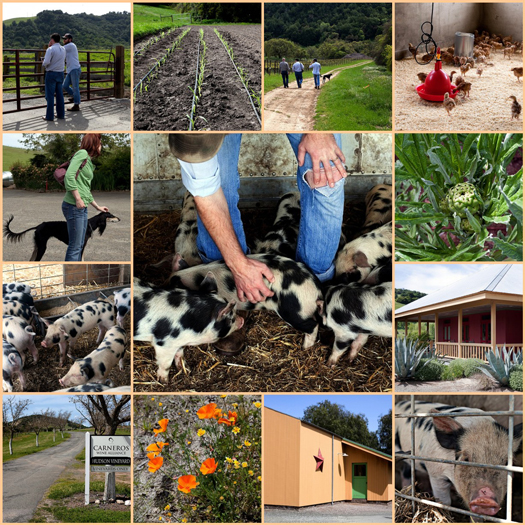
Last month, our friend Morgan Weber — who runs Revival Meats in Houston — came to town to talk shop with his Bay Area cohorts. He visited a who’s-who list of our local charcuterie shops and sustainable butchers, hitting up Fatted Calf, Boccalone, Bi-Rite Market, Prather Ranch, and a number of other carnivore havens. I don’t want to put words in anyone’s mouth, but I think it’s safe to say that one of the highlights of his trip was the Saturday afternoon spent at Hudson Ranch, a trip Morgan generously invited us to share.
Ranch manager Scott Boggs escorted us around Hudson’s spread, showing us both their hog and poultry sites, as well as their CSA vegetable farm. Hudson is primary known as a winery — their wines are cult favorites — but Scott came on board 2007 specifically to manage the edibles at Hudson Ranch. A veteran of The French Laundry’s garden operation as well as its kitchen, Scott brings true farm-to-table experience to the ranch; he understands what chefs want and need to see coming through the kitchen door.
We started our tour near the ranch offices, just off the main Carneros Highway. Our first stop — as Morgan was in town specifically to see them — was a pen full of dalmatian-spotted piglets, a litter born from an Old Spots sow mated to a boar of wilder heritage. Anyone with lingering doubts about how ethical meat can be would have been happy to see what we saw: A spacious, shaded pen with lots of room for piglets to play and plenty of room for their mama to move around (though she kept her snout in the trough during our whole visit), plus a view across to a beautiful lake and rolling hills beyond.
Down the road a piece, we got to peek in on a gaggle of chicks: babies in their boxes, and adolescents in their indoor roosts. By now, some of these birds are out on pasture, scratching away and fattening up for Chez Panisse and other local tables. A little further away, we trekked down a winding dirt road to check in on the CSA fields, where the first corn and tomato seedlings were already reaching for the sun.
We’re lucky that we were already eating lots of Hudson Ranch-raised food, even before we had any idea who they were. Hudson Ranch supplies Fatted Calf with some of their pork and poultry. (They also sell chickens and game hens to many restaurants you’d recognize.) The pig from Cameron’s birthday pig-roast last year was a Hudson, as were two of our last three Thanksgiving turkeys. Hudson also makes an award-winning olive oil, and they stock the produce shop at the Oxbow Public Market in Napa, in addition to supplying their CSA members’ weekly produce boxes.
One of my new year’s resolutions for 2010 was to eat more food grown by people we know. It wasn’t just born from a desire to eat more local food — we’re pretty much doing that all the time, now — but out of the realization that the closer we are to the source of our meals, the more satisfying they are for us. Even before last year, when we had the pleasure of picking our own tomatoes at Mariquita Farm, we were well acquainted with Julia, our Thursday night “casual CSA” farmer. And of course we had the privilege of helping Alexis and Eric after their devastating fire at Soul Food Farm, where our CSA chickens and eggs start out. We’ve toured Marin Sun Farms with Dave Evans, and seen where much of our beef, chicken, and pastured eggs come from.
Every time we open a quart jar of tomatoes, I’m reminded of the drive we took down to Watsonville and the morning we spent picking the very ripest Beefsteaks. When we enjoy a perfect omelette, a crisp roast chicken, or a plate of freshly dug new potatoes, we take a certain pride in knowing where it the ingredients came from, and in doing right by the food and the farmers who grew it. It may seem corny, but when we take a particularly delicious bite of food, we often thank the farmers, the ones who bring our daily feasts. I’m glad we can add Scott and his beautiful ranch to our roster of farmers we know.
Hudson Ranch
5398 Carneros Highway
Napa, California 94559
(by appointment only)
707-255-1455
http://www.hudsonia.com/hudson-ranch.html
@HudsonRanch on Twitter
—–
FTC disclaimers:
Morgan and Stacey Weber are friends of many years; Revival Meats is an editing client.
Hudson Ranch sent us a bottle of olive oil earlier this year as part of a media promotion.
farms & farmers, Napa & Sonoma
3 Comments »




Posted by Anita on 12.14.09 8:00 AM
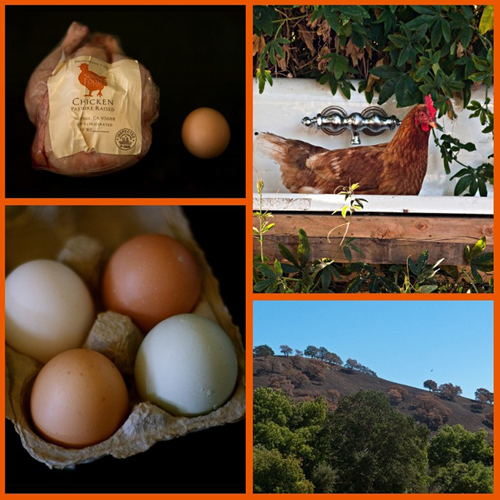
For two weeks each December, bloggers from all over the world offer a delectable array of food-related items for the Menu for Hope raffle. Last year, we raised $62,806 to help the UN World Food Programme feed the hungry. This year, we’re supporting a new initiative at the WFP called Purchase for Progress (P4P), which enables smallholder and low-income farmers to supply food to WFP’s global operation.
This year’s campaign runs December 14 to 25, and every $10 you donate earns you one virtual raffle ticket for the item of your choice. (To learn more, head over to Chez Pim and check out her Menu for Hope FAQ, or read the highlights at the bottom of this post.)
This year, we’re offering the following item, also focused on supporting small, local farms:
Bid Item UW02: Locavore Starter Kit
Many readers tell us that they’d love to eat more local foods, but they don’t know where to start. So we’re making it simple with a Locavore Starter Kit: A trial membership to the Soul Food Farm chicken-and-egg CSA (or another CSA of your choice* if you live outside the Bay Area) and a farmer’s market tour with breakfast and local treats.
- Soul Food Farm and Married …with Dinner are offering a $100 CSA credit toward the winner’s choice of whole chickens, eggs, olive oil, and other farm-fresh goodies. Pick up your winnings all at once, or spread it over multiple pickups: It’s up to you how to spend your CSA credit (subject to the usual order terms).
- Plus, Soul Food Farm farmer Alexis Koefoed offers a personal tour of Soul Food Farm for the winner and up to 3 guests at a mutually agreeable time in 2010.
- We’ll also include a personalized tour of the San Francisco Ferry Plaza Farmers Market, complete with breakfast or lunch for two, to help our winner find all the great foods they need to make the leap to la vida locavore.
- And if that’s not enough, we’ll also bring along a bag full of local treats and homemade goodies for you to take home after your walk-around. The bag will include some of our own preserves, and an assortment of treats from local folks — including a bag of brown rice and a jar of almond butter from Massa Organics.
* A special note for non-Bay Area bidders: If the winner’s residence is not located within 25 miles of a Soul Food Farm drop point, we’ll pay the first month’s box charges ($50 maximum) for any Community Supported Agriculture program in the winner’s area. And the market tour + breakfast portion is open to any winner, local or visitor, on any Saturday in 2010 (subject to Anita & Cameron’s availability). We can ship the goodie bag, but the winner would be responsible for all postage and packing charges.
To donate and enter the Menu for Hope raffle: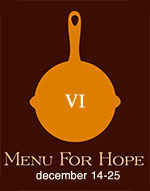
1. Choose bid item(s) from the main Menu for Hope list.
2. Visit the Firstgiving Menu for Hope page; make a donation.
3. Please specify which bid item(s) you’d like in the ‘Personal Message’ section of the donation form. You must write in how many tickets per bid item; please use the bid-item code. Each $10 you donate will give you one raffle ticket. For example, a donation of $50 can be 2 tickets for UW01 and 3 tickets for UW02 (written as 2xUW01, 3xUW02). The code for our Locavore Starter Kit is UW02.
4. If your company matches your charity donation, please check the box and fill in the information so Menu for Hope can claim the corporate match.
5. Please allow us to see your email address so that we can contact you in case you win. (Don’t check the box to keep your address private). Your email address will not be shared with anyone.
Check back here on Monday, January 18, for the results of the raffle. Good luck to everyone, and thanks for supporting such a worthy cause!
farms & farmers, giving back, locavore, Menu for Hope
7 Comments »




Posted by Anita on 10.09.09 8:47 PM

A few weekends ago, we had the pleasure of heading out to Vacaville to help Soul Food Farm rebuild some of the chicken houses that were destroyed in their fire last month. We spent the day in an open-air workshop under the big oaks, working with a dozen or so other volunteers, wielding powertools and hefting coop components to and fro. At lunchtime, we gathered around the farmhouse table and refueled with Soul Food Farm chicken (naturally) and a plethora of side-dishes contributed by friends and neighbors. It felt great to do an honest day’s work out in the fresh air — it felt very poignant to be working so hard in the shadow of the blackened hills you see above.
The farm did have insurance, but a high deductible with a lot of exclusions (no coverage for lost income from the chicks that died, nor for the lost pasture, for example) means that Soul Food Farm still desperately needs our help.
I know it’s hard in this financial atmosphere to send money off to strangers, however touching their story. So here are some ways to help this weekend that give you something delicious in exchange for your money:
Eat Dinner at Il Cane Rosso: Michelin-star chef Daniel Patterson is holding a fundraiser to benefit the farm at his restaurant Il Cane Rosso on Sunday, October 11. The cost of the three-course menu (served family-style), is $50 per person, including wine but exclusive of tax and gratuity. For reservations, call (415) 391-7599.
Come Party at Pizzaiolo: Tickets for the party this Sunday are sold out, but you can still get in the door — with a complimentary ticket — if you win one of the silent auction prizes (see below). And you want to bid on these great items.
Bid at the Online Auction: I know everyone says their charity auction has great prizes, but seriously folks. Check this out:
- Five baby chicks from Soul Food Farm — you want eggs, you’ll get ’em!
- Tickets to the sold-out City Arts Lecture with Michael Pollan & Wendell Berry,
plus signed copies of all of Pollan’s books
- A chance to pitch your manuscript to Chronicle Books editorial director
- A cheese master-class with Janet Fletcher, author of The Cheese Course
- Dinner for two in the kitchen at world-renowned Chez Panisse
- Portrait session with Bart Nagel including a retouched headshot
- A slot in one of master preservist June Taylor’s preserve-making classes
- Your choice of four different personal chef dinners and experiences
- A suckling pig for your holiday table from Clark Summit Farm
- Beautiful artisan-made jewelery, photographic prints, and other works of art
There are tons of other prizes — these are just my very favorites — and many of the coolest ones have no bids yet! So get on over there and win something cool. But don’t dally: Bidding closes in less than 24 hours (4 pm Pacific time, Saturday, October 10)
Join the Chicken & Egg CSA: Yep, just like a veggie CSA box, only this one’s got protein. Better still, deliveries are just once a month, and you get to pick how many chickens and dozens of eggs you want for each delivery. Drop-off points are available in Emeryville, Bernal Heights/Potrero Hill, Berkeley, and Hayes Valley on alternating weeks. And the prices are a good value, compared with the retail costs of the same items. Oh, and if you donated $25 or more to the Soul Food Farm Fire Fund, they will gladly credit your donation against your CSA fee. How cool is that?!
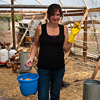
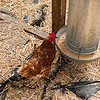

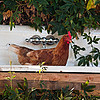

Soul Food Farm / Alexis and Eric Koefoed
6046 Pleasants Valley Road
Vacaville, CA 95688
(707) 469-0499
farms & farmers, giving back, locavore, other stuff
4 Comments »




Posted by Anita on 09.12.09 10:18 PM
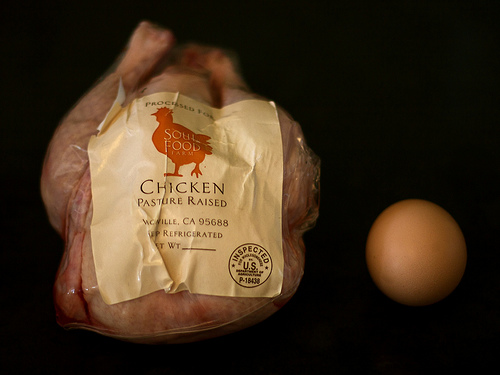
Sorry it’s been a little quiet around here. We’ve experienced some technical difficulties, but mostly we’ve just been busy, happily squeezing a lot of fun into a low-budget summer.
But as lovely as our summer was, the last few weeks have been rough for some of our nearest friends. Too many have said goodbyes to family members and beloved pets, and we’re feeling all the more thankful for the many blessings in our own lives.
A little further afield, last week brought a nightmare to one of our favorite local food suppliers. Soul Food Farm — home to our favorite pastured chickens and one of our regular sources of pastured eggs — was hit by a devastating fire in the middle of the night. Despite heroic efforts by farmers Alexis and Eric Koefoed (and their family and neighbors), they lost so much:
Two chicken houses caught on fire, and we lost 1,000 baby chicks. Trapped. Our old 1880s barn burned and it was almost too much at that moment. Thirty acres of pasture for the meat birds is gone and several old beautiful oaks, all the old plum trees that were our connection to the original homesteaders.
I know times are tight for so many, so I hesitate to ask you for help. But I also know — from the fabulous response we’ve had to Menu for Hope each year — there are many generous folks out there. If your finances allow, consider one of the following:
-
Donate directly to the Soul Food Farm recovery effort via Pay Pal.
- Buy tickets for the raffle that Bi-Rite Market is holding.
- Reserve a seat at one of the upcoming benefit dinners.
If you can’t afford the extra expense of donation, there are other ways to help:
- Join the Soul Food Farm chicken-and-egg CSA, which is starting soon.
Your membership fees will help give the farm much-needed cash flow.
- Volunteer for one of the upcoming farm work-days to help rebuild.
If you’re not particularly handy, there will be some non-construction chores.
- Consider shifting your chicken and egg purchases to Soul Food’s products.
Prather Ranch sells both items; check the SFF site for more outlets.
(Updated 9/15: Added a link above to Eater SF’s roundup post on the benefit dinners)
farms & farmers, giving back, other stuff
2 Comments »




Posted by Anita on 11.01.08 2:36 PM
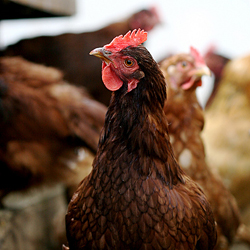 Last year, when I discovered — after reading Bonnie Powell’s excellent post — that the Judy’s Family Farm eggs I’d been buying at the Ferry Plaza Farmers Market were the product of an intensive factory operation called Petaluma Farm, I was pretty pissed.
Last year, when I discovered — after reading Bonnie Powell’s excellent post — that the Judy’s Family Farm eggs I’d been buying at the Ferry Plaza Farmers Market were the product of an intensive factory operation called Petaluma Farm, I was pretty pissed.
I first blamed CUESA, the market’s organizers, for allowing me to be duped. But soon I realized the real culprit was my own ignorance, and I directed my anger where it properly belonged. It was foolish, after all, to expect that all food sold at the Ferry Plaza market would meet some rudimentary ethical standard and that the products would be sold by, you know, actual small farmers. I really should have wondered how Judy’s managed to sell their eggs for a third of the price of Marin Sun or Eatwell, but I was blinded by the almighty bargain.
My frustration at having been deceived spurred me to pay closer attention to how the food — especially the eggs, dairy, and meat — we buy at the market is really grown. I spent the better part of 6 months asking a lot of questions, and I am sure some farmers got pretty sick of me. But when all was said and done, I was pleased to realize — with the exception of this one major blip in the egg department — that the Ferry Plaza was full of real farmers whose animal-care practices I can support in good conscience.
But now, with the attention CUESA has given Petaluma Farm as part of their coverage of Proposition 2 — the California initiative that would require all caged and crated animals the exceedingly modest consideration of being able to stand up, lie down, turn around, and extend their limbs — I feel I really must speak up and question their motives as an organization.
To put it in perspective: I realize that, as recently as last year, there weren’t enough pastured eggs to meet demand. Egg aficionados lined up before the market opened, and latecomers (or even on-timers) were often heard sighing over how they’d been beaten to the punch yet again. I’d like to think that the decision to permit this…. shall we say “less-than-ideal” vendor was a matter of filling in the gaps; local and quasi-free-range eggs are better than nothing. But now that Marin Sun, Eatwell, Marin Roots, and Soul Food offer a steady supply of pastured, humane egg options, I’m shocked that CUESA continues to allow large-scale, factory producers to sell at the Ferry Plaza market. There’s no excuse left that I can find.
But the thing that really sticks in my craw is that CUESA offered the bully pulpit of a prime feature spot in their weekly newsletter to the specious anti-Prop 2 arguments of Petaluma Farm’s Steve Mahr.
Mahr’s got a right to his opinions, and (for now at least) the legal freedom to cram as many laying hens into confinement as he sees fit. I’m glad to learn that he raises at least some fraction of his hens in a cage-free environment. But the hypocrisy of passing off his blatantly industrial product as the sustainable and humane gleanings of some idyllic family farm needs to be called out. And I’m absolutely furious that CUESA is letting it pass.
Mahr claims in the CUESA story that, “I will not be in business if Prop 2 passes.” To which I say: “It’s no worse than you deserve, you greenwashing jive-turkey.” At least the eggs sold at Safeway aren’t pretending to be anything other than the inhumane, factory-produced crap you’d expect.
Of course, pastured eggs are still a luxury that many shoppers can’t afford. But not everyone has room in their weekly food budget for pastured beef, either, and yet you don’t see CAFO meat at the Ferry Plaza. If CUESA is going to claim that one of the 10 reason to shop to shop at their farmers market is “to promote the humane treatment of animals … who have been spared the cramped and unnatural living conditions of so many of their brethren,” then that’s what should be offered, period. And they need to get on the bus and support Prop 2 without any ifs, ands, or buts.
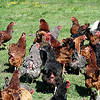



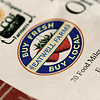
Pastured Eggs at the Ferry Plaza
Eatwell Farm
Nigel & Frances Walker
5835 Sievers Road
Dixon, CA 95620
organic@eatwell.com
866.627.2465
Marin Sun Farms
David & Julie Evans
10905 Highway 1
Point Reyes Station, CA 94956
david@marinsunfarms.com
415.663.8997
Soul Food Farm (at the Prather Ranch store)
Alexis & Eric Koefoed
6046 Pleasants Valley Road
Vacaville, CA 95688
soulfoodfarm@aol.com
707.469.0499
Marin Roots Farm
Jesse Kuhn
PO Box 74, Petaluma, CA 94952
info@marinrootsfarm.com
415.309.2474
More information about Proposition 2
Yes on Prop 2 official site
Michael Bauer (SF Chronicle)
Los Angeles Times (op-ed)
New York Times (endorsement)
Grist Environmental News
Oprah Winfrey Show
The Ethicurean
farmers markets, farms & farmers, locavore, other stuff
14 Comments »




Posted by Anita on 04.06.08 12:03 PM
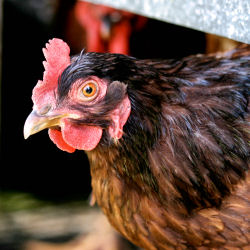 Before Niman Ranch started raising their herds on Iowa feedlots, their marketing materials bragged about “happy cows with ocean views”. Last Sunday, as we popped over the crest of Pierce Point Road and saw limitless green pasture dotted with black steers overlooking the deep blue waters of the Pacific, I gasped: It was exactly the scene that I’d held in my mind’s eye all these years. Only this land and these cattle belong to Marin Sun Farms, the ranch that supplies us with most of our eggs and meat.
Before Niman Ranch started raising their herds on Iowa feedlots, their marketing materials bragged about “happy cows with ocean views”. Last Sunday, as we popped over the crest of Pierce Point Road and saw limitless green pasture dotted with black steers overlooking the deep blue waters of the Pacific, I gasped: It was exactly the scene that I’d held in my mind’s eye all these years. Only this land and these cattle belong to Marin Sun Farms, the ranch that supplies us with most of our eggs and meat.
Even a week after our visit, I’m having a hard time expressing the depth of my awe for what David Evans is doing out on his Historic H Ranch, just 50 miles north of San Francisco. David’s family has farmed this same land since the early 1900s, although they were forced to sell it in the 1970s under the eminent domain act that created the Point Reyes National Seashore. The family leases back the land under what seems to be very tenuous circumstances: 5 year terms and government oversight of terribly minute details like the size of chicken flocks. Needless to say, it’s not the sort of sustainable permanence that makes this consumer particularly content.
Pronounced David’s way, the enterprise responsible for much of our weekly protein is properly known as “Marin Sun Farms” not “Marin Sun Farms.” Like his mentor Joel Salatin — who famously explained to Michael Pollan that he was a “grass farmer” — David takes pains to emphasize that his husbandry converts solar energy, by way of living pasture, into proteins that humans can digest. It’s half clever and half hokey, but undeniably true.
We started our tour overlooking the pasture where cows and calves ambled up and down spring-green hills, lolling in the lush grass or drinking from a large, clear pond. David talked at length about his ideology and his farming methods, explaining how herds — both chickens and cows — are moved to a different patch of land each week, preserving the pasture from over-grazing and enhancing the soil with their manure.
We peeked into a converted freight trailer turned chicken nursery, spying four gaggles of Easter-perfect chicks peeping around under heat lamps, pecking away at their feed. From there, we strolled down a wide lane to look in on David’s sister’s goat herd, busily clearing a scrubby yard where vegetables had been grown over the previous winter.
Beyond the goat yard, we saw two quonset hut-shaped structures on a distant hillside, our first glimpse of the farm’s egg-laying operation. Built of canvas-like material stretched over simple wood frames, these chicken houses open directly onto open pasture, without any physical barriers to any one of the chickens flying or wandering off. Apparently their social structure makes that unlikely; they’re much more apt to leave in the clutches of a predator, according to David. Perhaps half of the chickens roosted inside their homes, and the remainder scratched and pecked and flapped away outside in the open air. Glancing at the wide range of breeds, I suddenly understood the diversity of the colors and sizes of the eggs in our weekly dozen.
Many of us remarked with surprise that this egg-laying flock included a fairly large number of roosters, in addition to the laying hens. “I don’t do it so we can say the eggs are fertile,” said David, “But I know that I wouldn’t be happy in an environment without females, and I don’t think any of you ladies would be happy in a world without men.” Even as an unrepentant omnivore, it’s hard to wrap your brain around someone who makes his living selling meat treating his product with such humane regard.
Up the road a piece, we called on the broiler flocks, grown-up versions of the fuzzy peeps we’d seen pecking in the nursery. Penned in movable, mesh-covered yards — half in sun, half in shade — these birds were, quite frankly, the ugly ducklings of the farm. Where the laying hens are diverse and beautiful, Cornish Cross broilers look like the freaks of nature we’ve bred them to be. Sparsely feathered, dull around the eyes, and unbelievably gawky, these aren’t birds you feel too much sentiment toward. Still, they’re cared for with the same meticulous attention. They’re fed organic cracked grain, supplementing all the insects and grubs they can forage from their patch of pasture. At the end of the week, when they’ve cleared the pests and fertilized the land beneath their enclosures, their coops are canted up on a large dolly and rolled forward to a new stretch of green grass.
Sounds bucolic, and it certainly looks that way, too. Are things 100% perfect on this pastoral land? I’m sure they’re not. I would have been happier not knowing that Marin Sun Farms broiler chicks are fed imported Chinese soy until they’re old enough to digest corn and grubs. Or that David feels that heirloom birds are just too expensive (twice the cost of the already pricey hybrids he brings to market, he says) and don’t taste any better than the ugly mutants. Or that most of the calves born at his parents’ H Ranch operation are destined for life on the feedlots of the Midwest, because there simply isn’t enough demand for pasture-raised beef. But despite all of the things that I wish they were doing more-perfectly, the simple fact is that I am in awe of the 99% that Marin Sun Farms is doing exactly right.
Rounding our way back to the main barn, David stopped to talk about the on-farm ‘processing’ — that is, slaughtering — that farmers are, thankfully, still allowed to do for their own poultry. As he explained that the next part of the tour was occasionally more than some visitors had bargained for, I finally focused beyond David’s shoulder, at last noticing a critical part of the farm that had previously escaped my notice. Having read Michael Pollan’s description of the Polyface Farms “abattoir without walls,” I knew enough to recognize it: The metal cones where chickens are killed and bled out, the plucking machine with its hundred rubber ‘fingers’, the well-worn worktables, the buckets for the blood and guts that get turned into the compost pile to amend the land. No roof, no walls; everything open to the sun and the wind, nature’s original sanitizers. It was all right there… right there for anyone to see, to understand.
I knew well enough we wouldn’t see any chickens slaughtered that Sunday — it happens on Thursdays, anyway, and the oldest of this season’s broilers were still a week from market, merrily clucking away in the pasture. Nothing had been slaughtered here since the old roosters and hens had come to market last winter; the killing place smelled of nothing but the hillside around us. And yet, it had the undeniable air of purpose. I won’t insult you by saying it felt holy, but I do know that there was no nervous laughter, no chatter, no wandering off to investigate something more interesting around the corner. Every one of us on that tour, kids included, was completely present there, standing inside the boundaries of the place where animals became food: The place where each bird experiences what David calls its “one bad day” on the farm.
—-
When the tour was over, we caravaned back over the road to Route 1. David treated everyone to lunch at the Marin Sun Farms Butcher Shop, a bountiful spread of Della Fattoria bread, the farm’s own rib eye and roast goat, bowlsful of aioli and horseradish cream and salsa verde, and buckets of German-style potato salad with flecked with rich bacon.
But the best part of the lunch was the beverage: David brought out “a gift” — which he couldn’t legally sell to us — of a few gallons of raw milk “just hours out of the cow” in oversized Mason jars. I’d shied away from buying raw milk at the stores, imagining that it would taste grassy or gamey. But oh, lord, what I’d been missing! It just tasted more milk-y, like a better version of the best milk you’ve ever had. Nuances of flavor, texture, and color are apparent even to the most casual observer.
Needless to say, we bought a quart of Claravale raw milk this Saturday, and I don’t expect to go back to the sterile, flat stuff anytime soon. Nor do I expect I will soon forget the windy spring morning when I looked my supper in the eye and made peace with my place on this sustainable food chain.
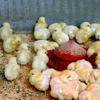
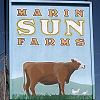
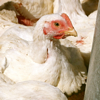
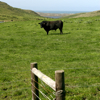
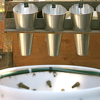
Marin Sun Farms
10905 Shoreline Highway
Point Reyes Station, CA 94956
415-663-8997
Meat CSA memberships available starting at $270 for a 6-month session
Retail sales available at the Point Reyes butcher shop, Saturday Ferry Plaza Farmers Market and Sunday San Rafael Civic Center Farmers Market
Next farm tour: May 18, 2008
Adults $30, Kids $10
(Pre-registration is mandatory)
Dark Days challenge, farmers markets, farms & farmers, locavore, meat, shopping
13 Comments »





























